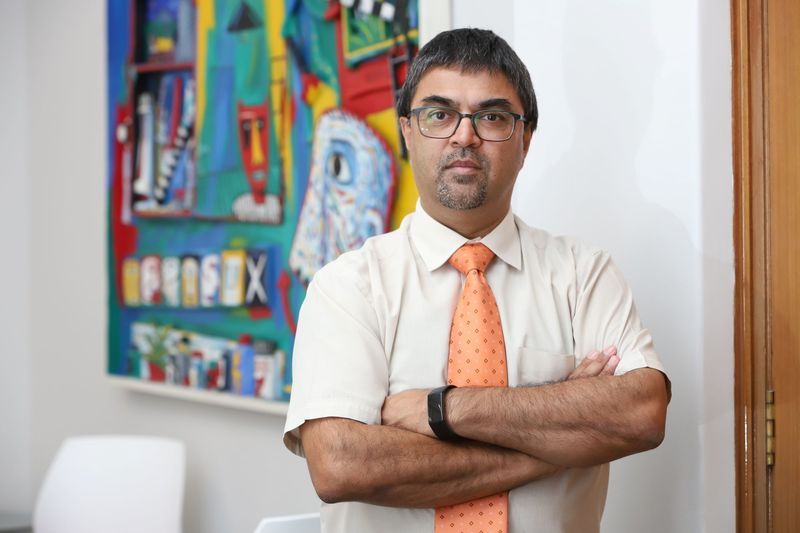Vision 2030: realising UCT’s dream
02 September 2020 | Story Carla Bernardo. Photo Michael Hammond. Read time 6 min.
For a dream to be realised, the path towards it and the steps required need to be articulated and actioned. According to the University of Cape Town’s (UCT) chief operating officer (COO), Dr Reno Morar, this dream for the university is Vision 2030.
“I see Vision 2030 as our dream … over the next 15 to 20 years. And if you have a dream, you have to do things now.”
Dr Morar was speaking at the fifth virtual Vision 2030 staff engagement session, which took place on Friday, 21 August 2020, alongside Vice-Chancellor Professor Mamokgethi Phakeng and other members of the executive team.
“We need to work with everybody … to think of creative ways, innovative models of doing things, and making sure that academic and PASS staff work together to create a new UCT.”
Vision 2030 is the university’s proposed new institutional strategy, which is built on three pillars that are fundamental to UCT’s academic project: excellence, transformation and sustainability. It is driven by the statement that “UCT is a global university in Afrika* unleashing human potential to create a fair and just society”.
To realise this dream, the university will strive to make distinct contributions in the following four areas:
- holistic, innovative, future-oriented education
- solving Afrika’s problems through research
- thought leadership on social justice
- an organisational ethos that supports new ways of thinking, being and doing.
Innovation and creativity
When compiling the strategy, the Vision 2030 Task Team – which Morar leads with Deputy Vice-Chancellor for Teaching and Learning Associate Professor Lis Lange – was deliberate in creating working groups from across the university, featuring the input of over 100 members of academic, and professional, administrative support and service (PASS) staff. Already new ways of thinking, being and doing were under way.
“For Vision 2030, we have no block on innovation and creativity. It is seeking that innovation and creativity from colleagues … that is going to make UCT a different place.”
He added that working together and working in new ways will be key to realising the Vision 2030 dream: “We need to work with everybody … to think of creative ways, innovative models of doing things, and making sure that academic and PASS staff work together to create a new UCT.”
In terms of his portfolio, Morar briefly discussed three areas that he believes could be “unleashed”, areas where there is ample space for innovation and creativity: systems, service delivery models and people.
He provided examples of what work in these areas will look like, including improving the systems used in human resources or student administration, making them more effective, efficient and welcoming; rethinking service delivery models so that UCT staff can thrive; and putting people – the institution’s greatest assets – at the centre of the Vision 2030 strategy.
“For Vision 2030, we have no block on innovation and creativity. It is seeking that innovation and creativity from colleagues … that is going to make UCT a different place,” he said.
Policies, skills and training
The work required to create a new UCT is already in progress, an example of which is a work-from-home policy that is under way. Before the COVID-19 pandemic, UCT was already considering this policy, which has since been accelerated by the crisis, Morar said.
This policy, and all other new ways of thinking, being and doing, will require considerations and actions, such as digital innovation, a focus on outputs and a change in ethos. It will also, in some regards, require re-learning by and re-skilling of staff members.
“We can’t do this alone; we have to do it together.”
Morar said that the university would work with staff so that they acquire the necessary skills and training. He called on executives and management to offer their teams training and learning opportunities, and he encouraged staff members to take the initiative in driving change. This training, he said, should be provided to individuals and teams, afforded based on talent, and must deal with organisational culture and ethos.
“Only if we align all three of those will we truly be able to put strategic plans in place to realise Vision 2030.”
Managing the crisis
Morar turned his attention to the impact of the pandemic on staff’s mental and emotional well-being and the management of the crisis by UCT’s executive.
The COO said that it is important to note that we are, in fact, in a crisis and that until 2021 the executive’s focus will be on managing it and on doing their best to ensure stability. Thereafter, the focus will be on recovery.
He acknowledged the stress that staff members have been under during the crisis and committed himself and his portfolio to reducing the levels of frustration and anxiety.
He added that he and the rest of the executive are taking to heart the lessons learned during the pandemic and said that while they don’t always get it right, they are committed to doing so alongside their colleagues at the university.
“We can’t do this alone; we have to do it together,” he said.
*UCT’s choice to spell Afrika in this way is an invitation to reclaim Afrika’s agency and use it to validate the global character of the local in the 21st century.
Visit the Vision 2030 website.
 This work is licensed under a Creative Commons Attribution-NoDerivatives 4.0 International License.
This work is licensed under a Creative Commons Attribution-NoDerivatives 4.0 International License.
Please view the republishing articles page for more information.










